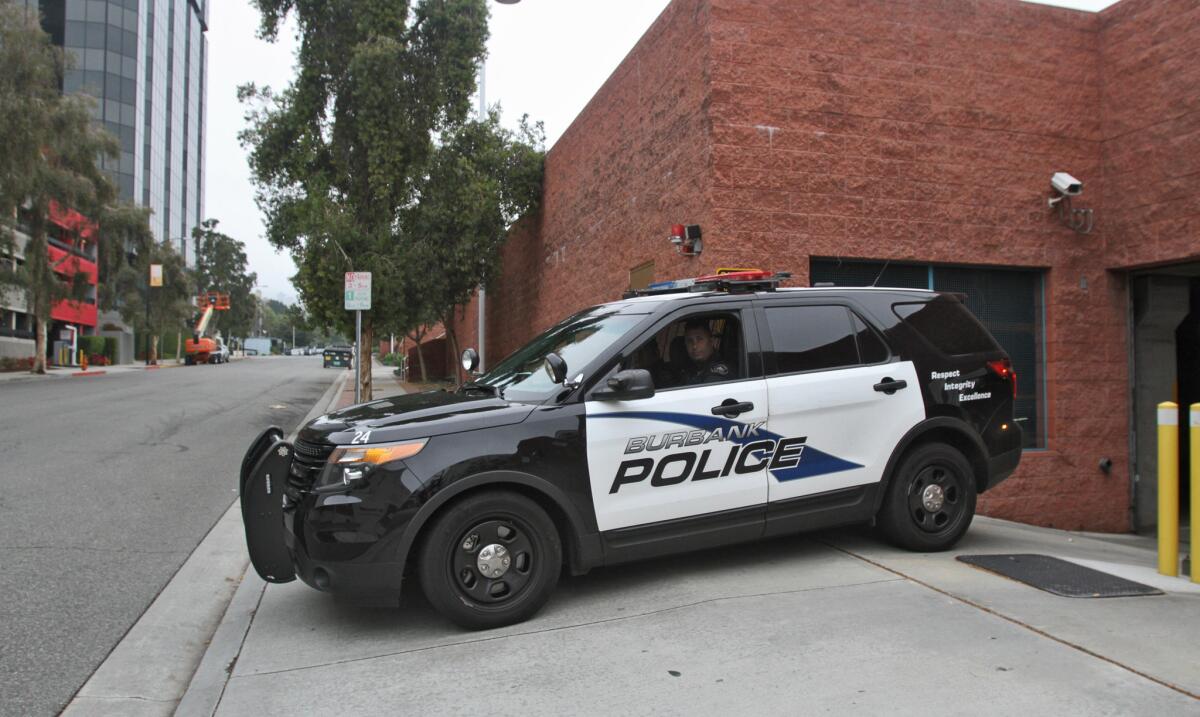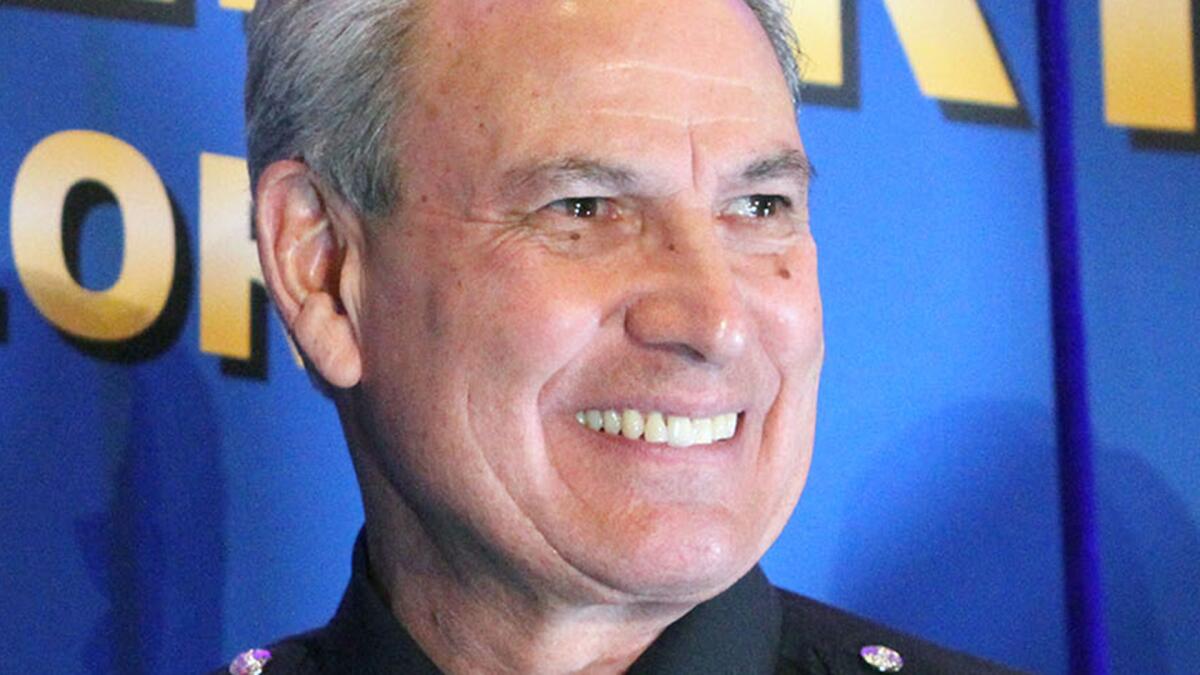Morale low, lack of improvement felt within Burbank Police Department, survey shows
- Share via
Staffing shortages, fewer opportunities for job growth and a perception of bias in promotions and policy enforcement are hampering morale at the Burbank Police Department, according to the results of a police-union-administered survey.
The Burbank Police Officers’ Assn. last month invited 135 members, including officers of all ranks, as well as seven recent retirees, to take the survey. They answered 11 questions, some with multiple parts, and were given space to write comments.
Roughly half of the 118 participants indicated that they’d considered leaving the department sometime during the last year, while 60% indicated they were unlikely or extremely unlikely to recommend a career with the agency to their children, relatives or friends.

About 75% indicated that morale was low, or extremely low, with one member calling the department a “depressing” place to work, while another wrote that “pretty much everyone dreads going to work.”
Meanwhile, 73% of participants disagreed or strongly disagreed that the agency has improved its level of service to the community over the last five years.
The goal of the survey, union leaders said, was to identify problems and work with management to improve working conditions.
Burbank Police Chief Scott LaChasse said in emails Tuesday it would be premature to comment on the survey without first engaging in “good faith discussions” with the union, but pointed to the department’s 2011 strategic plan, which focused on changes to ensure officer safety, reduce liability issues and guarantee ethical behavior.
“The process of cultural change is proceeding and the objectives are being achieved,” LaChasse wrote.
What motivation is there for me to go out there and place myself in a situation that could jeopardize mine and my (family’s) future.
— Participant in Burbank police survey
To boost morale, dozens of members who completed the survey advocated that the agency hire more officers, increase specialty assignments, improve leadership at the top and rely less on predictive policing technology, which analyzes crime reports to predict potential problem areas.
Patrol officers are required to spend 15 minutes each in up to three areas during their 12-hour-and-20-minute shifts.
Critics of the system say that the algorithm sometimes zeroes in on obvious areas, like the Empire Center, where officers already know there’s retail crime, or silly ones, like the police station, where people often show up to report crimes.
But top cops say police visibility in the areas helps deter crime.
“When it’s adhered to, it shows efficacy in terms of lowering crime,” said Capt. Denis Cremins. “Our No. 1 functional objective is to prevent crime; it’s not to arrest people. You try to prevent it or deter it — this is just a sophisticated way of doing it.”
In terms of hiring, the agency has made progress filling vacancies and recruiting diverse candidates to join the force.
Several months into a two-year recruitment plan that involves offering more testing cycles, attending more recruiting events and targeting military personnel, the agency has hired five recruits and two police officers, raising the number of filled sworn positions to 152 of 160.
Within that group, one recruit is Armenian, another is Latino and a third is black, according to Lt. Eric Deroian, who oversees recruitment. One of them is also female.
But it’ll be awhile before officers feel the additional manpower on the street. Two of the recruits will graduate the academy in November, the other three in January. Meanwhile, about a couple dozen officers are eligible to retire.
“When you have low morale, if people aren’t happy, that could accelerate, could affect the retention level,” said Sgt. Sean Kelley, a union board member. “The hiring happening now may not keep up with the people that are leaving in the future.”
Less than a quarter of survey respondents felt that promotions, special assignment appointments and personnel investigations were handled fairly, while just 11% felt that department policies were enforced fairly to all ranks.
“We are now in a society that doesn’t support police and have a command staff that will be quick to crush us for any mistake,” one participant wrote. “What motivation is there for me to go out there and place myself in a situation that could jeopardize mine and my (family’s) future.”
Police sources supportive of changes made by the current administration disputed concerns over perceived fairness, while noting that officers are paid well — a new contract approved earlier this year involved salary increases — have access to working equipment and are supported by the community.
“If I was being investigated now, I would feel comfortable with the investigation,” said one sworn employee, who asked not to be named. “If I was being investigated with the prior administration, I would be scared to death.”
Join the conversation on Facebook >>
Some in the agency feel handcuffed by what they called overly restrictive policies, including those involving use of force, as well as foot and vehicle pursuits, but others say those policies are based on best practices in a changing law enforcement culture.
“Very few agencies now are allowing you to go on a wild pursuit over something as minimal as a red light violation,” said the officer who asked for anonymity. “There is a probability that someone will crash at a high rate of speed, and someone — suspect, officer, bystander — may be hurt or killed over a traffic violation that if it’s their first time, they can go to traffic school. Is that really worth it?”
The survey results were critical of the agency’s leadership, which consists mostly of Los Angeles Police Department veterans brought to the helm in 2010 to reform a department reeling from allegations of police brutality as well as racism and sexual harassment within its ranks.
Tensions flared recently after the Burbank Leader published emails forwarded in 2012 and 2013 by a key member of LaChasse’s reform team that contained stereotypes of Muslims, blacks, Latinos, women and others.

Former Burbank Deputy Chief Tom Angel in Feb. 2015.
Former Deputy Chief Tom Angel left the Burbank force last year to return to the Los Angeles County Sheriff’s Department, where he’d previously spent 33 years. In May, he resigned his post as Sheriff Jim McDonnell’s chief of staff in the wake of the email scandal after numerous civil rights advocates called on him to step down.
Union leaders criticized how LaChasse handled the discovery of the emails in 2014, which was part of what prompted the survey. Concerns over staffing shortages, morale and policies also played a role.
The survey results echoed concerns raised in a smaller-scale survey conducted early last year by the Center for Public Safety Management, which drew responses from 82 officers.
According to the 2015 report, sworn employees complained about staffing deficiencies, low morale and poor communication by higher ups.
--
Alene Tchekmedyian, alene.tchekmedyian@latimes.com
Twitter: @atchek
MORE CRIME & PUBLIC SAFETY
Man dies after exchanging gunfire with Burbank police, then shooting himself
Lifeguard accused of secretly recording girls and women in locker room pleads not guilty
Local detectives seize weapons, make arrests during gang-enforcement effort
